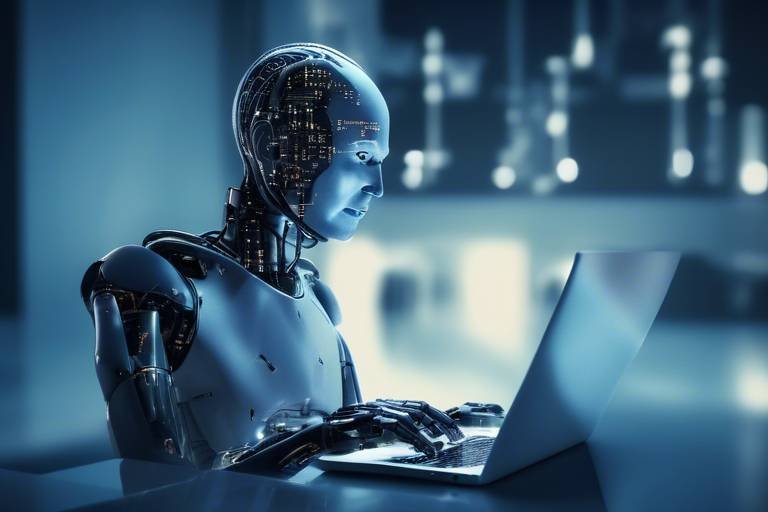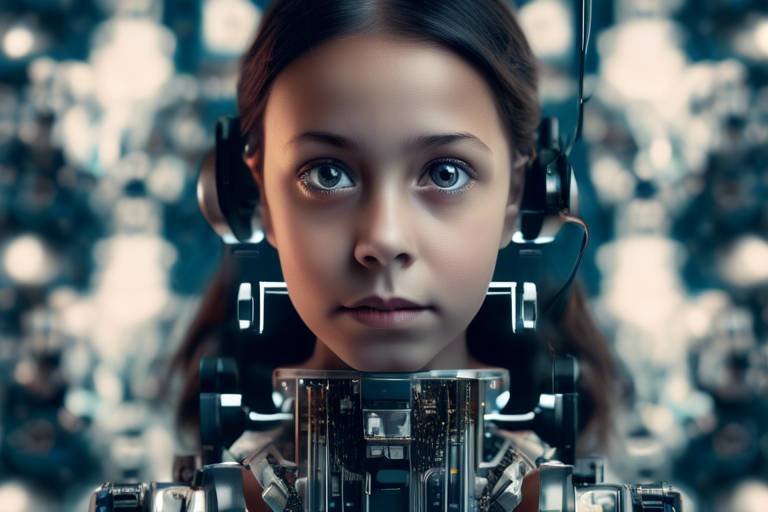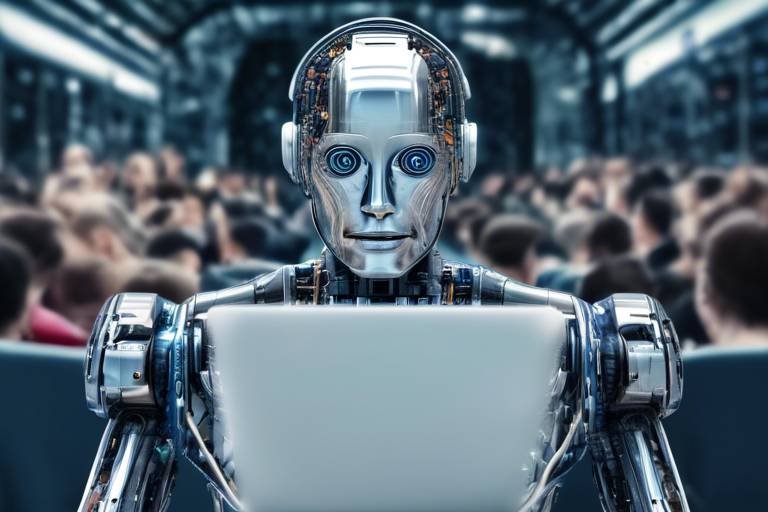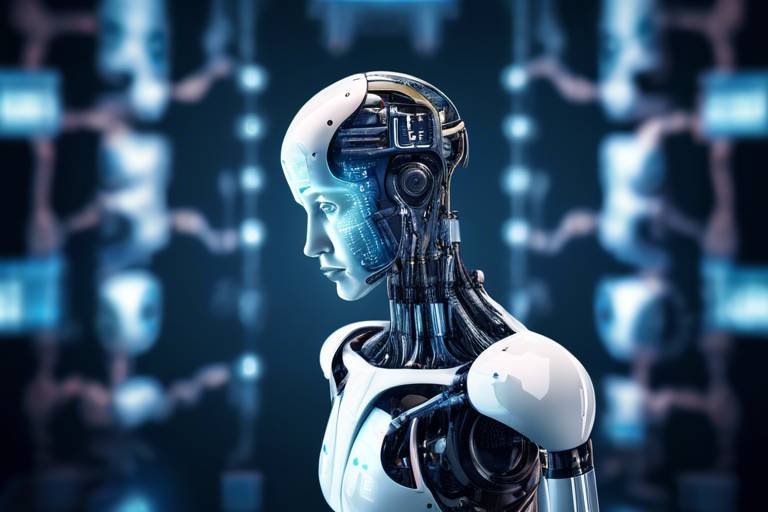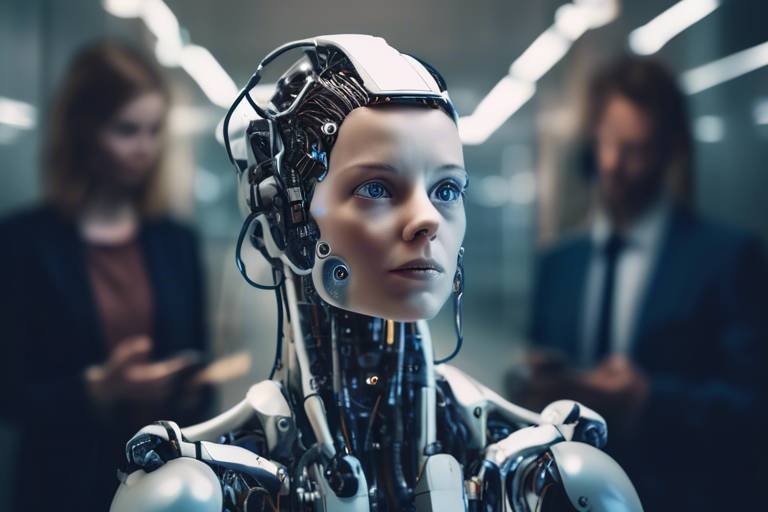Double-Edged Sword: The Ethics of AI
In today's rapidly advancing technological landscape, artificial intelligence (AI) stands out as a double-edged sword. On one side, it offers remarkable opportunities for innovation and efficiency, reshaping industries and enhancing our daily lives. But on the flip side, it presents a myriad of ethical dilemmas that challenge our understanding of responsibility, fairness, and privacy. As we embrace this powerful tool, we must ask ourselves: how do we navigate the complex maze of benefits and risks that AI brings?
The ethical implications of AI are vast and varied, encompassing issues such as job displacement, privacy concerns, and inherent biases in algorithms. Each of these areas not only affects individuals but also has broader societal impacts. For instance, while AI can automate mundane tasks, freeing up human creativity and potential, it also raises questions about the future of work and the economic landscape. As we delve deeper into the promise and perils of AI, it becomes increasingly clear that we need to adopt a balanced approach, one that maximizes its benefits while minimizing its risks.
Moreover, the responsibilities of developers and users cannot be overstated. Developers have the ethical duty to create AI systems that are not only efficient but also fair and transparent. This involves rigorous testing and validation to ensure that the algorithms do not perpetuate existing biases or create new forms of discrimination. On the other hand, users must be educated about the implications of AI technologies, empowering them to make informed decisions about how they engage with these systems.
As we explore the ethical landscape of AI, we must remain vigilant and proactive. The decisions we make today will shape the future of AI and its role in society. Are we prepared to face the challenges that come with this technological revolution? Will we prioritize ethical considerations over mere convenience and profit? These are questions that demand our attention as we stand at the crossroads of innovation and ethics.
Artificial intelligence holds immense potential to revolutionize industries, enhance productivity, and improve quality of life. From healthcare to finance, AI applications are already making significant strides in diagnosing diseases, predicting market trends, and even personalizing customer experiences. The promise of AI lies in its ability to analyze vast amounts of data at lightning speed, uncovering insights that humans alone might miss. This capability can lead to groundbreaking advancements, such as precision medicine, where treatments are tailored to individual genetic profiles, or smart cities, where AI optimizes traffic flow and energy consumption.
However, understanding its benefits helps frame the ethical discussions surrounding its development and deployment. As we harness the power of AI, we must also consider the implications of its use. For instance, while AI can drive efficiency, it can also lead to over-reliance on technology, potentially diminishing human skills and judgment. The challenge lies in finding a balance that allows us to reap the rewards of AI while safeguarding our values and humanity.
While AI offers significant advantages, it also poses serious risks, including job displacement, privacy violations, and biased algorithms. Addressing these concerns is crucial for ethical AI implementation. As we delve deeper into these issues, it's essential to recognize that they are interconnected. For example, job displacement caused by automation can lead to economic instability, which in turn can exacerbate privacy concerns as individuals seek new ways to secure their livelihoods.
As AI systems automate tasks traditionally performed by humans, the potential for job loss raises ethical questions about economic impact and workforce transitions. The fear of widespread unemployment is not unfounded, as many industries are already experiencing significant changes. For instance, roles in manufacturing and customer service are increasingly being filled by AI technologies, leading to a shift in the job market.
Investing in education and training programs for displaced workers is essential. This approach ensures that individuals can adapt to new job markets created by AI advancements. By providing opportunities for reskilling, we not only help individuals regain their footing but also foster a more resilient economy. After all, the future of work will likely demand new skills that we cannot even imagine today.
Some propose universal basic income (UBI) as a solution to job displacement. This concept raises ethical questions about fairness, economic sustainability, and societal values in the age of AI. While UBI could provide a safety net for those affected by automation, it also challenges our traditional notions of work and contribution to society. Is it fair to provide income without requiring work? These are difficult questions that require thoughtful consideration.
The use of AI in surveillance raises significant ethical concerns regarding individual privacy rights. Balancing security with personal freedoms is a critical issue in the AI ethics debate. As governments and corporations increasingly deploy AI technologies for monitoring and data collection, individuals may find their privacy eroded. The question arises: how much surveillance is acceptable in the name of safety? Striking a balance between protecting citizens and respecting their privacy is paramount.
AI systems can perpetuate or even exacerbate existing societal biases. Understanding these biases is vital for developing fair and equitable AI technologies that serve all individuals. When AI algorithms are trained on biased data, they can produce skewed outcomes that reinforce stereotypes and discrimination. This not only affects individuals but can also have broader societal implications, leading to systemic inequality.
The data used to train AI models can contain inherent biases, leading to skewed outcomes. Addressing data quality and representation is essential for ethical AI development. Developers must ensure that the datasets used to train algorithms are diverse and representative of the populations they serve. This requires a commitment to inclusivity and a willingness to confront uncomfortable truths about our societal structures.
Establishing accountability for AI decisions is crucial. Ethical frameworks must be developed to ensure transparency and responsibility in algorithmic processes, protecting against discriminatory practices. As AI continues to evolve, it is imperative that we hold developers and organizations accountable for the outcomes of their technologies. This includes creating mechanisms for oversight and recourse for those affected by biased or harmful AI decisions.
- What is AI? AI, or artificial intelligence, refers to the simulation of human intelligence in machines designed to think and act like humans.
- What are the ethical concerns surrounding AI? Ethical concerns include job displacement, privacy violations, and bias in algorithms.
- How can we mitigate job displacement caused by AI? Solutions include reskilling programs and exploring concepts like universal basic income.
- Why is privacy a concern with AI? AI technologies can lead to increased surveillance, potentially infringing on individual privacy rights.
- How can we ensure fairness in AI? By addressing data bias and establishing accountability for AI systems.

The Promise of AI
Artificial intelligence (AI) is not just a buzzword; it’s a transformative force that promises to reshape our world in ways we are only beginning to understand. Imagine a world where mundane tasks are automated, leaving humans free to engage in more creative and fulfilling pursuits. This is the vision that AI brings to the table. With its ability to analyze vast amounts of data at lightning speed, AI can enhance productivity across various sectors, from healthcare to finance, and even in our daily lives.
One of the most exciting aspects of AI is its potential to improve decision-making processes. By leveraging machine learning algorithms, businesses can gain insights from data that were previously unattainable. For instance, in healthcare, AI can analyze patient data to predict outcomes, personalize treatments, and even assist in surgeries, leading to better patient care and potentially saving lives. In finance, AI systems can detect fraudulent activities in real-time, safeguarding both consumers and institutions.
Moreover, AI can play a significant role in tackling global challenges. For example, in environmental science, AI can help model climate change scenarios, optimize energy consumption, and even assist in wildlife conservation efforts. The ability to process and analyze data from complex systems makes AI a powerful ally in our quest for sustainability.
However, the promise of AI extends beyond just efficiency and productivity. It has the potential to enhance quality of life in profound ways. Consider the advancements in smart home technologies, where AI-driven devices can learn user preferences, automate tasks, and even improve home security. These innovations not only make our lives easier but also provide a sense of comfort and safety.
Yet, as we marvel at the possibilities that AI presents, it’s crucial to remain grounded in reality. The benefits of AI are immense, but they come with a responsibility. Developers and users alike must navigate this evolving landscape with a strong ethical compass. To harness the full potential of AI, we need to foster an environment that encourages innovation while addressing the ethical implications that arise.
In summary, the promise of AI is vast and multifaceted. From revolutionizing industries and improving decision-making to enhancing our everyday lives, AI stands at the forefront of technological advancement. Embracing this technology with a commitment to ethical practices will ensure that its benefits are realized by all, creating a future that is not only smarter but also fairer.

Risks and Concerns
While artificial intelligence (AI) has the power to transform our lives for the better, it also brings with it a host of risks and concerns that cannot be ignored. Imagine a double-edged sword; on one side, it can cut through inefficiencies and drive progress, but on the other, it can inflict serious harm if wielded carelessly. As we delve into the ethical implications of AI, it becomes increasingly clear that we must tread carefully. The following areas highlight some of the most pressing risks associated with AI:
- Job Displacement: With the rise of automation, many jobs that were once performed by humans are now being taken over by machines. This shift raises fundamental ethical questions about the economic impact on workers and the responsibilities of companies in this new landscape.
- Privacy Violations: AI technologies, particularly in surveillance, can lead to significant breaches of individual privacy. The balance between security and personal freedom is a delicate one, and it raises questions about how much surveillance is acceptable in the name of safety.
- Biased Algorithms: AI systems are only as good as the data they are trained on. If that data is flawed or biased, the outcomes will reflect those biases, perpetuating existing inequalities and injustices in society.
Addressing these concerns is not just an option; it is a necessity. As we continue to integrate AI into various aspects of our lives, we must ask ourselves: are we prepared to handle the consequences? Each of these issues presents a unique challenge, and finding solutions will require collaboration among developers, policymakers, and society as a whole.
As AI systems become increasingly capable of performing tasks traditionally associated with human labor, the potential for job loss looms large. Think about it: entire industries could be transformed overnight, leaving countless workers in the lurch. This raises ethical questions about the economic ramifications of such a shift. How do we ensure that those displaced by AI are not left behind? Solutions must be explored to mitigate these effects, and proactive measures are essential.
One of the most effective ways to combat job displacement is through reskilling the workforce. Investing in education and training programs for displaced workers is crucial. It’s like giving someone a new toolbox for a different job; with the right skills, they can adapt to new job markets created by AI advancements. Programs that focus on technology, critical thinking, and creativity can empower individuals to thrive in a rapidly changing job landscape.
Another proposed solution to job displacement is the concept of Universal Basic Income (UBI). This idea, while intriguing, raises its own set of ethical questions. Is it fair to provide a safety net for those who lose their jobs to machines? How do we ensure that UBI is economically sustainable? These are questions that society must grapple with as we move further into the age of AI. UBI could serve as a cushion for those affected, but it also challenges our notions of work and value.
The use of AI in surveillance is a hot-button issue that raises significant ethical concerns regarding individual privacy rights. As technology advances, the capability for constant monitoring increases, leading to a society where privacy may become a relic of the past. Balancing security with personal freedoms is a critical issue in the AI ethics debate. Are we willing to sacrifice our privacy for the sake of safety? This is a question that requires serious contemplation.
In conclusion, while AI presents remarkable opportunities for innovation and improvement, we must remain vigilant about its risks and concerns. The ethical implications of job displacement, privacy violations, and biased algorithms demand our attention and action. As we continue to navigate this complex landscape, it is imperative that we do so with responsibility and foresight.
1. What are the main risks associated with AI?
The primary risks include job displacement, privacy violations, and biased algorithms that can perpetuate societal inequalities.
2. How can we address job displacement caused by AI?
Investing in reskilling programs and exploring concepts like Universal Basic Income can help mitigate the impact of job loss due to automation.
3. Why is privacy a concern with AI technology?
AI technologies, especially in surveillance, have the potential to infringe on individual privacy rights, raising ethical questions about the balance between security and freedom.
4. How can we ensure AI systems are unbiased?
Addressing data quality and representation is essential for ethical AI development. Establishing accountability for AI decisions is also crucial.

Job Displacement
As we stand on the brink of an AI-driven future, one of the most pressing concerns is the issue of . The rise of artificial intelligence and automation is akin to a double-edged sword; while it brings forth remarkable efficiencies and innovations, it simultaneously threatens to uproot countless jobs traditionally held by humans. Imagine waking up one day to find that the job you’ve dedicated years to is now being performed by a machine. It's a chilling thought, isn't it?
The potential for job loss raises profound ethical questions about the economic impact on individuals and communities. As AI systems take over tasks—from manufacturing to customer service—many workers may find themselves at a crossroads, facing unemployment or the need to transition into entirely new roles. This scenario is not just a distant possibility; it's a reality that is already unfolding in various sectors.
To tackle the challenges posed by job displacement, we must explore viable solutions that can help mitigate these effects. Here are some approaches that can be considered:
- Reskilling the Workforce: Investing in education and training programs is essential. By equipping workers with new skills, we can help them adapt to the evolving job market created by AI advancements. This means not only offering technical training but also fostering soft skills that remain invaluable in human-centric roles.
- Universal Basic Income: Some advocate for universal basic income (UBI) as a safety net for those affected by job loss. However, this concept raises ethical questions about fairness, economic sustainability, and societal values in the age of AI. Will UBI be a temporary fix or a long-term solution?
Moreover, the conversation around job displacement isn’t just about the numbers; it’s about the human stories behind those numbers. Each job lost represents a family impacted, a community shaken, and a life altered. Therefore, as we innovate and deploy AI technologies, we must also prioritize ethical considerations that take into account the well-being of affected individuals.
In conclusion, while AI presents exciting opportunities for growth and efficiency, we must not overlook the ethical implications of job displacement. It is crucial for developers, policymakers, and society at large to engage in meaningful dialogue and action to ensure a balanced approach that safeguards the future of work in an AI-enhanced world.
1. What is job displacement in the context of AI?
Job displacement refers to the loss of jobs due to automation and AI technologies taking over tasks traditionally performed by humans.
2. How can workers prepare for job displacement?
Workers can prepare by seeking reskilling opportunities, staying informed about industry trends, and being open to transitioning into new roles.
3. What role does universal basic income play in addressing job displacement?
Universal basic income is proposed as a financial safety net for individuals who lose their jobs due to automation, raising discussions about economic sustainability and fairness.
4. Why is it important to address the ethical implications of job displacement?
Addressing the ethical implications is crucial to ensure that the transition to an AI-driven economy is equitable and considers the well-being of affected individuals and communities.

Reskilling the Workforce
As we stand on the brink of an AI-driven future, the conversation around has never been more critical. With machines taking over tasks that were once the bread and butter of human labor, we must ask ourselves: how do we prepare our workforce for this inevitable shift? The answer lies in proactive education and training programs that not only equip individuals with new skills but also foster a mindset of lifelong learning. This is not just about surviving the changes; it's about thriving in a new landscape where adaptability is key.
Imagine a world where every worker has the opportunity to transition into roles that complement AI, rather than compete with it. This vision is achievable through targeted reskilling initiatives that focus on high-demand fields such as data analysis, machine learning, and digital marketing. By investing in these areas, we can create a workforce that is not only resilient but also capable of driving innovation. For instance, companies could partner with educational institutions to develop curricula that reflect the skills needed in today's job market, ensuring that workers are well-prepared for the challenges ahead.
Moreover, reskilling isn’t just the responsibility of employers or educational institutions; it’s a shared effort that requires collaboration between government, businesses, and individuals. Governments can play a pivotal role by offering incentives for companies that invest in employee training programs. This can create a ripple effect, encouraging more businesses to prioritize workforce development. Additionally, workers themselves must take the initiative to seek out opportunities for growth, whether through online courses, workshops, or mentorship programs.
To illustrate the potential impact of reskilling, consider the following table, which outlines the benefits of investing in workforce training:
| Benefit | Description |
|---|---|
| Increased Employability | Workers gain new skills that make them more attractive to employers. |
| Higher Job Satisfaction | Employees feel more engaged and valued when they receive training. |
| Economic Growth | A skilled workforce drives innovation and productivity, benefiting the economy. |
| Reduced Unemployment | Reskilling helps displaced workers find new opportunities, lowering joblessness. |
In conclusion, the challenge of reskilling the workforce is daunting, but it is a challenge we must embrace. By fostering a culture of continuous learning and collaboration, we can transform the potential threat of job displacement into an opportunity for growth and innovation. As we navigate this new era of AI, let’s remember that technology should enhance human capabilities, not replace them. Together, we can build a future where everyone has the chance to succeed, no matter how the job landscape evolves.
- What is reskilling? Reskilling refers to the process of learning new skills to adapt to changing job requirements or industries, often due to technological advancements.
- Why is reskilling important in the age of AI? As AI continues to automate tasks, reskilling is essential to ensure that workers can transition into new roles that complement technological advancements.
- How can workers find reskilling opportunities? Workers can seek reskilling opportunities through online courses, community colleges, workshops, and employer-sponsored training programs.
- What role do companies play in reskilling? Companies can invest in employee training programs, partner with educational institutions, and create a culture of continuous learning to support workforce development.

Universal Basic Income
Universal Basic Income (UBI) is a concept that has gained traction as a potential solution to the challenges posed by AI-induced job displacement. Imagine a safety net that provides individuals with a regular, unconditional sum of money, regardless of their employment status. This idea is not just a whimsical thought experiment; it's a serious proposal that has sparked intense debate among economists, policymakers, and the general public. But what does UBI really entail, and how could it reshape our society in the age of AI?
At its core, UBI aims to ensure that everyone has a basic level of financial security, which can help cushion the blow of job loss due to automation. With the rapid advancement of AI technologies, many fear that traditional jobs will vanish, leaving millions without a source of income. UBI could serve as a buffer, allowing individuals to meet their basic needs while they transition into new roles or explore entrepreneurial opportunities. However, the implementation of such a system raises several ethical questions:
- Fairness: Is it fair to provide income to those who may not need it, while others struggle to make ends meet?
- Economic Sustainability: Can governments afford to implement UBI without causing inflation or reducing funding for essential services?
- Societal Values: What does the adoption of UBI say about our collective values and priorities as a society?
Critics argue that UBI could disincentivize work, leading to a culture of dependency. However, proponents counter that it could empower individuals to pursue work that is more meaningful and fulfilling, rather than being driven solely by financial necessity. In fact, studies from various pilot programs around the world have shown that when people receive a basic income, they often invest in education, start businesses, and contribute positively to their communities.
To illustrate the potential impact of UBI, consider the following table that summarizes findings from UBI trials conducted in different regions:
| Location | Duration | Key Findings |
|---|---|---|
| Finland | 2 years | Increased well-being and mental health; no significant decrease in employment. |
| Ontario, Canada | 1 year | Improved health outcomes and reduced hospital visits. |
| Stockton, California | 18 months | Reduced income volatility and increased full-time employment among participants. |
As we navigate the complexities of AI and its societal implications, UBI presents a fascinating possibility. It challenges us to rethink our approach to work, income, and the very structure of our economy. While the road to implementing UBI may be fraught with challenges, the potential benefits for individuals and society as a whole are worth exploring. After all, in a world increasingly shaped by technology, shouldn't we ensure that everyone has the means to thrive?
- What is Universal Basic Income? UBI is a model of social security in which all citizens receive a regular, unconditional sum of money from the government.
- How could UBI help with job displacement due to AI? UBI provides financial security, allowing individuals to transition to new jobs or pursue education without the immediate pressure of financial instability.
- Are there any successful examples of UBI in practice? Yes, various pilot programs in Finland, Canada, and Stockton, California have shown positive effects on well-being and employment.
- What are the main criticisms of UBI? Critics argue it could disincentivize work and raise questions about economic sustainability and fairness.

Privacy and Surveillance
The rapid advancement of artificial intelligence has transformed the way we interact with technology, but it has also opened a Pandora's box of ethical dilemmas, particularly regarding privacy and surveillance. Imagine walking down the street, and every step you take is monitored by countless cameras equipped with facial recognition software. It sounds like a scene out of a dystopian movie, yet it's becoming a reality. As AI systems become more integrated into our daily lives, the balance between security and personal freedom is increasingly precarious.
On one hand, AI can enhance security measures, helping to prevent crime and ensure public safety. For instance, cities are deploying AI-driven surveillance systems to analyze real-time data and identify suspicious activities. However, this comes at a cost. The more we rely on these technologies, the more we risk infringing on individual privacy rights. Are we willing to trade our freedom for a sense of safety? This question looms large in the ongoing debate about the ethics of AI surveillance.
Moreover, the data collected through surveillance can be misused. In the wrong hands, it can lead to a chilling effect on free speech and civil liberties. People may feel less inclined to express their opinions or engage in public demonstrations if they believe they are being constantly watched. This creates a society where fear of surveillance stifles creativity and expression, ultimately undermining the very democratic values we hold dear.
To illustrate the potential consequences of AI-driven surveillance, consider the following table that outlines the benefits and risks:
| Benefits | Risks |
|---|---|
| Enhanced public safety | Invasion of privacy |
| Crime prevention | Data misuse and abuse |
| Efficient resource allocation | Chilling effect on free speech |
As we navigate this complex landscape, it is essential to establish ethical guidelines that govern the use of AI in surveillance. This includes ensuring transparency in how data is collected, used, and shared. Users should have the right to know what information is being gathered about them and how it is being utilized. Furthermore, accountability mechanisms must be put in place to hold organizations responsible for any misuse of data.
Ultimately, the challenge lies in finding a balance between leveraging AI for security while safeguarding individual rights. This requires a collaborative effort from policymakers, technologists, and society at large. As we move forward, it is crucial to engage in meaningful conversations about the ethical implications of AI surveillance and to advocate for policies that prioritize human dignity and freedom.
- What are the main ethical concerns regarding AI surveillance? The primary concerns include invasion of privacy, potential misuse of data, and the chilling effect on free speech.
- How can we balance security and privacy? Establishing ethical guidelines, ensuring transparency, and implementing accountability measures can help maintain this balance.
- What role do policymakers play in regulating AI surveillance? Policymakers are crucial in creating laws and regulations that protect individual rights while allowing for the beneficial use of AI technologies.

Bias in AI
Artificial Intelligence (AI) is a powerful tool, but it comes with its own set of ethical challenges, particularly in the realm of bias. Bias in AI can manifest in various ways, often leading to unfair treatment of individuals or groups. This is not just a minor inconvenience; it can have profound implications on the lives of people affected by these biased systems. Imagine a world where your job application is filtered out not because you lack the qualifications, but because of the data biases inherent in the AI systems that make hiring decisions. It’s a chilling thought, isn’t it?
The roots of bias in AI often lie in the data used to train these systems. If the data itself is skewed or unrepresentative, the AI will inevitably produce skewed outcomes. For instance, if an AI system is trained predominantly on data from one demographic, it may struggle to accurately serve or represent others. This can lead to a cycle of discrimination where certain groups are consistently marginalized or misrepresented. The implications are vast, affecting areas such as hiring, law enforcement, and even healthcare.
To illustrate this point, consider the following table that outlines some common sources of bias in AI:
| Source of Bias | Description |
|---|---|
| Data Bias | When the training data is not representative of the entire population, leading to skewed AI outcomes. |
| Algorithmic Bias | When the algorithms themselves are designed in a way that favors certain outcomes over others. |
| Human Bias | When developers unintentionally embed their own biases into the AI systems through design choices. |
Addressing bias in AI is not merely a technical challenge; it’s a moral imperative. Developers and organizations must acknowledge the potential for bias and actively work to mitigate it. This means investing in diverse datasets that accurately reflect the population and implementing rigorous testing to identify and correct biases before deployment. However, this is easier said than done. The question arises: how can we ensure accountability in AI systems?
One approach is to establish algorithmic accountability. This involves creating ethical frameworks that ensure transparency in how AI decisions are made. Stakeholders should be able to understand the reasoning behind AI outcomes, which can help identify and rectify biases. For example, if a hiring algorithm consistently favors one demographic, organizations must have the tools and frameworks in place to investigate and adjust these algorithms accordingly.
In summary, bias in AI is a multifaceted issue that requires a concerted effort from developers, organizations, and policymakers to address. By understanding the sources of bias and implementing strategies to combat them, we can pave the way for more equitable AI technologies. The goal is to create systems that not only enhance productivity but also uphold the values of fairness and justice in our increasingly digital world.
- What is bias in AI? Bias in AI refers to the tendency of AI systems to produce skewed or unfair outcomes based on the data they are trained on.
- How can bias in AI affect individuals? Bias in AI can lead to discrimination, affecting job opportunities, access to services, and overall treatment of individuals from various demographics.
- What steps can be taken to reduce bias in AI? Organizations can reduce bias by using diverse datasets, implementing rigorous testing, and ensuring transparency in AI decision-making processes.
- Why is algorithmic accountability important? Algorithmic accountability ensures that AI systems are transparent and that stakeholders can understand the reasoning behind AI decisions, which helps identify and correct biases.

Data Bias
When we talk about , we're diving into a deep pool of ethical implications that can ripple through our society. Imagine a chef who only uses ingredients from a specific region; the dishes they create will reflect that narrow selection, potentially missing out on flavors from around the world. Similarly, AI systems learn from the data they're fed. If that data is biased, the outcomes will be too, leading to skewed results that can unfairly impact certain groups of people.
Data bias can manifest in various ways, often stemming from historical inequalities or societal stereotypes. For instance, if an AI model is trained on data predominantly from one demographic, it may not perform well for individuals outside that group. This is particularly concerning in critical areas such as hiring practices, law enforcement, and healthcare, where biased algorithms can perpetuate discrimination. Picture a hiring algorithm that favors candidates from a particular school because most of its training data came from there. This not only limits opportunities for deserving candidates but also reinforces existing inequalities in the job market.
Addressing data bias is essential for developing ethical AI technologies. It involves a multifaceted approach that includes:
- Improving Data Quality: Ensuring that the data used for training AI models is comprehensive and representative of diverse populations.
- Regular Audits: Conducting frequent checks on AI systems to identify and rectify any biases that may arise.
- Inclusive Data Collection: Actively seeking out data from underrepresented groups to create a more balanced dataset.
Moreover, transparency in the data collection process is crucial. Developers should openly communicate how data is gathered and what measures are in place to mitigate bias. This not only builds trust with users but also fosters accountability in AI development. Imagine if every time you ordered a meal, the restaurant disclosed where each ingredient came from; you’d likely feel more confident in your choice. In the same vein, knowing the origins of AI training data can empower users to make informed decisions.
In conclusion, tackling data bias is not just a technical challenge; it’s a moral imperative. As we forge ahead in the age of AI, we must ensure that our systems are designed to be fair and equitable, reflecting the diverse tapestry of our society. Only then can we harness the full potential of artificial intelligence while safeguarding the rights and dignity of all individuals.
- What is data bias? Data bias refers to the presence of systematic errors in data that can lead to unfair outcomes in AI models.
- Why is data bias a concern in AI? Data bias can perpetuate existing inequalities and lead to discriminatory practices, affecting areas like hiring and law enforcement.
- How can data bias be addressed? By improving data quality, conducting regular audits, and ensuring inclusive data collection practices.
- What role does transparency play in mitigating data bias? Transparency helps build trust and accountability, allowing users to understand how data is collected and used in AI systems.

Algorithmic Accountability
In the rapidly evolving world of artificial intelligence, the concept of has emerged as a crucial pillar in the ethical debate surrounding AI technologies. As AI systems become more integrated into our daily lives—ranging from automated decision-making in hiring processes to predictive policing—the need for transparency and responsibility in these algorithms becomes increasingly apparent. But what does it really mean to hold algorithms accountable? It’s about ensuring that the decisions made by AI systems can be scrutinized, understood, and, when necessary, challenged. This is particularly important because the consequences of these decisions can significantly impact individuals and communities.
One of the key challenges in achieving algorithmic accountability lies in the opacity of AI systems. Many algorithms operate as "black boxes," where the inner workings are not visible or comprehensible to users, developers, or even the organizations that deploy them. This opacity raises serious ethical questions: How can we trust a system that we do not understand? How do we ensure that these systems are not perpetuating existing biases or making decisions that are harmful to certain groups? To address these concerns, we need to establish clear frameworks that promote transparency and allow for independent audits of AI systems.
Several strategies can be employed to enhance algorithmic accountability:
- Transparency in Data Usage: Organizations should disclose the types of data used to train their AI models, as well as the methodologies behind their algorithms. This openness can help identify potential biases in the data.
- Regular Audits: Implementing routine audits of AI systems can help ensure that they are functioning as intended and not producing discriminatory outcomes. These audits should be conducted by independent third parties to maintain objectivity.
- Stakeholder Engagement: Involving a diverse group of stakeholders—including ethicists, affected communities, and technologists—in the development and oversight of AI systems can provide valuable perspectives and foster accountability.
Moreover, the establishment of ethical guidelines and regulatory frameworks is essential. Governments and organizations should collaborate to create policies that hold developers accountable for the outcomes of their algorithms. This could involve legal repercussions for discriminatory practices or failures to address biases, ensuring that companies take their responsibilities seriously. Just as we have regulations governing financial markets to prevent fraud, we need similar measures to protect individuals from the potential harms of biased or opaque AI systems.
In conclusion, algorithmic accountability is not just a technical issue; it is a moral imperative in the age of AI. As we continue to integrate these powerful technologies into our lives, we must prioritize transparency, responsibility, and ethical considerations in their development and deployment. Only then can we harness the potential of AI while safeguarding the rights and dignity of all individuals.
Q1: What is algorithmic accountability?
Algorithmic accountability refers to the responsibility of developers and organizations to ensure that AI systems operate transparently and fairly, allowing for scrutiny and challenge of their decisions.
Q2: Why is transparency important in AI?
Transparency is crucial because it allows users and stakeholders to understand how AI systems make decisions, helping to identify biases and ensure that these systems do not perpetuate discrimination.
Q3: How can we audit AI systems?
Auditing AI systems can be done through independent evaluations that assess their performance, fairness, and adherence to ethical guidelines. Regular audits help maintain accountability and trust in AI technologies.
Q4: What role do stakeholders play in algorithmic accountability?
Stakeholders, including ethicists, community members, and technologists, can provide diverse perspectives that inform the development and oversight of AI systems, ensuring that they serve the interests of all individuals and communities.
Frequently Asked Questions
- What are the main benefits of AI?
AI has the potential to revolutionize various industries by enhancing productivity, improving decision-making, and automating mundane tasks. It can lead to innovations in healthcare, finance, and transportation, ultimately improving our quality of life.
- What risks are associated with AI?
While AI offers numerous advantages, it also presents risks such as job displacement, privacy violations, and biased algorithms. These concerns necessitate careful consideration and ethical guidelines to ensure responsible AI development and deployment.
- How does AI contribute to job displacement?
AI systems can automate tasks that were traditionally performed by humans, which may lead to job losses in certain sectors. This raises ethical questions about the economic impact on workers and the need for effective workforce transitions.
- What solutions exist for reskilling displaced workers?
Investing in education and training programs is essential for helping displaced workers adapt to new job markets created by AI advancements. This proactive approach can mitigate the negative impacts of job displacement.
- What is Universal Basic Income (UBI) and how does it relate to AI?
Universal Basic Income is a proposed solution to job displacement caused by AI, providing individuals with a regular, unconditional payment to cover basic living expenses. This concept raises ethical questions about fairness and societal values in an AI-driven economy.
- How does AI impact privacy and surveillance?
The use of AI in surveillance raises significant ethical concerns regarding individual privacy rights. Striking a balance between security and personal freedoms is a critical issue that must be addressed in the ongoing AI ethics debate.
- What is data bias in AI?
Data bias occurs when the data used to train AI models contains inherent biases, leading to skewed outcomes. Addressing data quality and representation is vital for ensuring that AI technologies are fair and equitable.
- Why is algorithmic accountability important?
Establishing accountability for AI decisions is crucial to ensure transparency and responsibility in algorithmic processes. Developing ethical frameworks can help protect against discriminatory practices and uphold fairness in AI applications.



